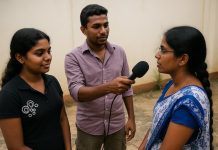
Our role as journalists is to unearth information, prepare it and then display it for the benefit of the audience. We are not there to fabricate, manipulate or force.
We are there to uncover facts, not plant them. So what are the essential attitudes needed when going out on a story?
I wrote this article after an experience in the Caucasus when a young journalist interviewed me. I was told the interview was going to be about the course I was running.
However it became clear that the reporter had only one question in mind. She wanted to know what I thought of the political situation in her country, and she kept repeating the question, clearly eager to hear the answer that she wanted to hear from a visiting journalism trainer from England.
She kept returning to the same question to which I was only able to tell her that I was there to deliver journalism training and not to comment on the country’s political situation.
But she wouldn’t give up, and each time she asked the question she became more and more animated adding opinion and some anger to her leading questions.
It was an approach that I had not personally been exposed to before. And it made me think about how important it is for journalists to remain objective and impartial not only when reporting about events, but also when planning interviews.
It also reminded me of the many times I have gone out on a story with an end result in mind. Like all journalists, I always wanted my story to run, either in print when I was a newspaper journalist, or in the bulletins and current affairs shows when I was a radio and TV correspondent.
I also wanted it to be hard-hitting, insightful, memorable and – let’s be honest – to win me praise and make me look good.
Looking back, and with the Caucasus interview in mind, here are a few thoughts on how to make sure journalism relates to reality and not our own idea of how a situation should play out.
1: Retain an open mind
It’s fine to set off on an interview having done your research and with one burning question in your mind. In fact, not to do so could be seen as sloppy and could leave you open to manipulation.
However, you need to retain an open mind and accept that unexpected things may happen. It may be that there is a stronger line of questioning than the one you had thought of as you set off for the interview.
You will probably not spot that opportunity if you are working to a set script and have an end result in mind. So it’s important to be prepared to leave your script behind and retain an open mind when you meet your interviewee.
2: Don’t force an issue
Some journalists misinterpret resistance to questioning to be an admission of guilt, and that if the interviewee refuses to answer, or avoids the question, they have something to hide. It might not mean that.
However it could mean that it was a bad question not relevant to the topic. It could also mean that the person you are interviewing genuinely doesn’t have an answer or opinion. or it could mean that you don’t understand the complexity of the issues being discussed.
Press too hard at times like these and you could end up damaging the integrity of the media organisation you represent. Confrontation is not necessarily a sign of good journalism – just because you get a reaction doesn’t mean you have made a good point.
3: Be firm but fair
You can be rigorous and robust in your interviewing and remain fair. You probably won’t achieve this with a shouting match and a standoff. It will need clear questioning and sensible interpretation of the answers.
Your role is not to appear smart and score points against the interviewee. Your role is to inform the public debate so that the audience can make educated choices.
Be prepared to back down if you have asked a question that is clearly irrelevant and off-topic. Be prepared to admit when you are wrong or when you are still learning. Be prepared to acknowledge a good point if the interviewee offers a plausible explanation.
Always challenge yourself more than you challenge the interviewee. If not, you will appear arrogant. Interviews should be conversations, not lectures. Interviews conducted with a desired end result are rarely more than rants, and fitting only to those media organisations that have vested interests controlling their editorial agenda.








